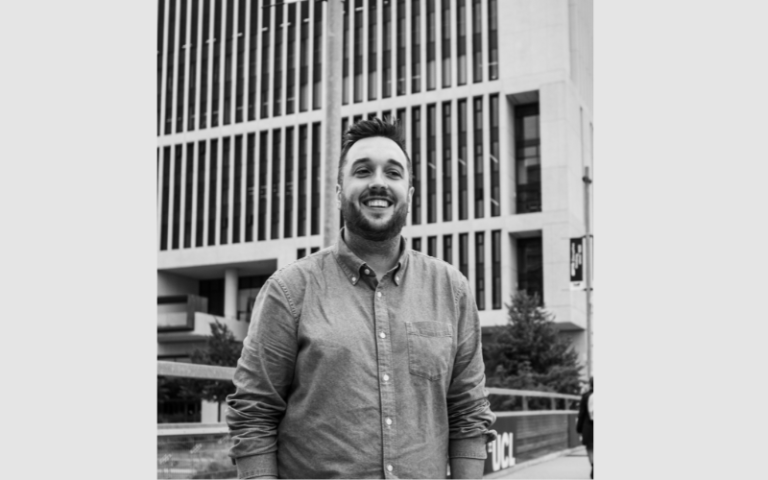Spotlight: Joseph Cook
18 January 2024
Meet Joseph Cook who leads UCL Citizen Science Academy. He tells us about his role training residents in social science research, what led him to anthropology and social science at the intersection with architecture, and his passion for American culture

Could you tell us a bit about your background?
When I left school in the south-west of the UK I knew two things – that I wanted to escape the countryside, and I wanted to become an architect. I never achieved the latter and I’m rather starting to want to go back to the countryside again. I’d watched a lot of ‘Grand Designs’ on TV and having already spent a year doing sculpture at the local college it seemed that design was the way to go.
Half-way through my undergraduate degree I realised that I was much more interested in ‘architecture’ than in ‘becoming an architect’. I wanted to interview people about the places they worked or lived in, and study how the design of these spaces that we spend so much time in actually affects us.
Eventually someone told me that if I’d looked a page earlier in the university prospectus I would have seen the word ‘anthropology’ so I changed to pursue that instead for my Masters.
I’m now nearing the end of my PhD, which involved completing an ethnography of an international office design firm, and finding the space between architecture and the social sciences a fascinating area to be researching within.
Could you tell us about a current project you’re working on and what you have coming up?
I currently help lead the new UCL Citizen Science Academy within the Institute for Global Prosperity, which often involves collaborating with local authorities, voluntary sector organisations and the private sector in delivering citizen science courses with local residents of a particular area.
I’m currently teaching a cohort of seven citizen scientists in Camden, and we’re due to start another in Tower Hamlets shortly. Working with people who are so passionate and dedicated to the mission of improving the lives of the communities they live in is incredibly inspiring and motivating.
I’m also involved with a project called The Architecture of Pharmacies, together with a fantastic interdisciplinary team, and we’re looking at how community pharmacies on our high streets can become more inviting and inclusive.
What does prosperity mean to you?
I find it incredibly hard to relax. And I think the times that I most feel that I’m ‘doing well’ are when I am relaxed. I think that’s the kind of thing that prosperity is about really. It’s not about having the money to buy things. It’s about having the time to see your friends, or being able to treat yourself to something, or just spend a day doing nothing.
Of course free time is, to many around the world, a luxury that has a financial barrier, but I think that it’s the end product, the time-freedom, that makes you feel prosperous. I recently started renting a shipping container art studio near the Olympic Stadium, and I often now go in there just to escape the world. It’s glorious, really it is.
What professional achievement or initiative are you most proud of?
I live on a canal boat and during Covid-19 I realised that a lot of my neighbouring ‘boaters’ were not registered with a GP or had tried to register and been wrongly turned away, often due to not having a fixed address. Together with Nura Ali, a colleague from UCL Department of Planning Unit, we secured some funding from UCL Grand Challenges to do some research on this. The outputs from the project which is called Navigating the System have been part of an exhibition at UCL East, featuring the photography of boater Caitlin Vinicombe. We’re now going to show them in Paris in Spring, as part of a Festival of Democracy and Healthcare. It’s been great to pursue a piece of important research connected directly to my friends and neighbours.
Who is influential to you and why?
Not famous people really, or big academics. I think often it’s just people I’ve worked with briefly and now look back and imagine what they would do in a particular situation. I interned with a shadow culture minister as an undergrad and she changed my view on politics, for the better. I spent some time working with the most amazing entrepreneur in Accra, Ghana, who was running an NGO from his living room. And of course, through my current citizen science work you meet so many people who are passionate about changing their local communities for the better – it’s very uplifting.
Do you have a recent book, film, or podcast that you would recommend?
I’m completely obsessed with American culture. I think if I were rich I’d just walk around middle America listening to people. I was in Washington DC after the 2016 election, and I when I walked past the Trump Hotel I was approached by one of his more eccentric supporters who just talked at me for like an hour and a half. One of her neighbours had tried to get her dog taken away because she’d put a Trump wig on it. She kept singing John Lennon songs at me but changing words to ‘Trump’. A reporter from ABC News standing nearby said he thought I had more staying power than anyone he’d ever met. I could have stayed all day. It was fascinating. So I love films about rural or working class America. I cried a bit watching 'The Florida Project' and 'American Honey'. 'Some Kind of Heaven' was also just the most amazing film ...and 'Hands on a Hardbody'. Another good one that’s just come out is 'Carpet Cowboys'.
 Close
Close

